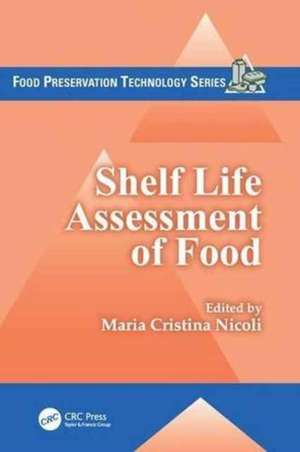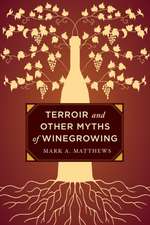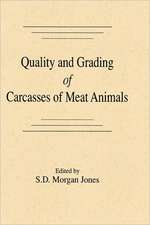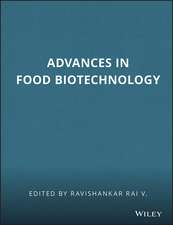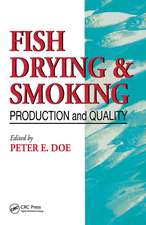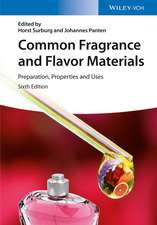Shelf Life Assessment of Food: Food Preservation Technology
Editat de Maria Cristina Nicolien Limba Engleză Paperback – 16 noi 2016
Offering an integrated view of the present status of shelf life assessment, the book covers:
- Definitions, basic concepts, and regulatory aspects of food shelf life
- The shelf life assessment process, including preliminary steps, testing, modeling, and monitoring
- Methods for determining acceptability limits
- Critical indicators in shelf life assessment
- Real-time and accelerated shelf life testing
- Microbial indicators for shelf life prediction and determination
- Survival analysis methodologies and their role in modeling shelf life
- The effect of packaging materials properties in food shelf life assessment
Providing researchers and food industry operators with up-to-date data and procedures, this volume surveys the most critical factors and methods for obtaining accurate and reliable shelf life dating.
| Toate formatele și edițiile | Preț | Express |
|---|---|---|
| Paperback (1) | 700.75 lei 6-8 săpt. | |
| CRC Press – 16 noi 2016 | 700.75 lei 6-8 săpt. | |
| Hardback (1) | 1936.00 lei 6-8 săpt. | |
| CRC Press – 11 mai 2012 | 1936.00 lei 6-8 săpt. |
Preț: 700.75 lei
Preț vechi: 854.57 lei
-18% Nou
Puncte Express: 1051
Preț estimativ în valută:
134.12€ • 138.22$ • 113.23£
134.12€ • 138.22$ • 113.23£
Carte tipărită la comandă
Livrare economică 03-17 martie
Preluare comenzi: 021 569.72.76
Specificații
ISBN-13: 9781138199347
ISBN-10: 1138199346
Pagini: 316
Ilustrații: 113
Dimensiuni: 156 x 234 mm
Greutate: 0.45 kg
Ediția:1
Editura: CRC Press
Colecția CRC Press
Seria Food Preservation Technology
ISBN-10: 1138199346
Pagini: 316
Ilustrații: 113
Dimensiuni: 156 x 234 mm
Greutate: 0.45 kg
Ediția:1
Editura: CRC Press
Colecția CRC Press
Seria Food Preservation Technology
Cuprins
An Introduction to Food Shelf Life: Definitions, Basic Concepts, and Regulatory Aspects.The Shelf Life Assessment Process. The Acceptability Limit. Critical Indicators in Shelf Life Assessment. Modeling Shelf Life Using Chemical, Physical, and Sensory Indicators. Modeling Shelf Life Using Microbial Indicators. Modeling Shelf Life Using Survival Analysis Methodologies. Packaging–Food Interactions in Shelf Life Modeling. Case Studies. Index.
Notă biografică
Maria Cristina Nicoli’s research activity chiefly focuses on chemical and physical factors affecting food functionality and stability. The main topics are the effect of processing on the antioxidant properties of plant derived foods, antioxidant properties of Maillard reaction products, the effect of physical state on food stability and the development of food shelf life predictive models.
Descriere
Determining accurate shelf life data for foods is essential for assuring food quality and protecting consumers from the effects of degradation. This volume presents the essential criteria and current methodologies for obtaining accurate and reliable shelf life dating. Defining the process through a series of sequential steps, the book assists and supports researchers and food industry operators in planning a shelf life study that best suits their needs. The book includes a series of case studies that begin by defining acceptability limits and identifying the indicators of quality loss. Next, the book examines expiration time assessment by instrumental or sensory tools.
